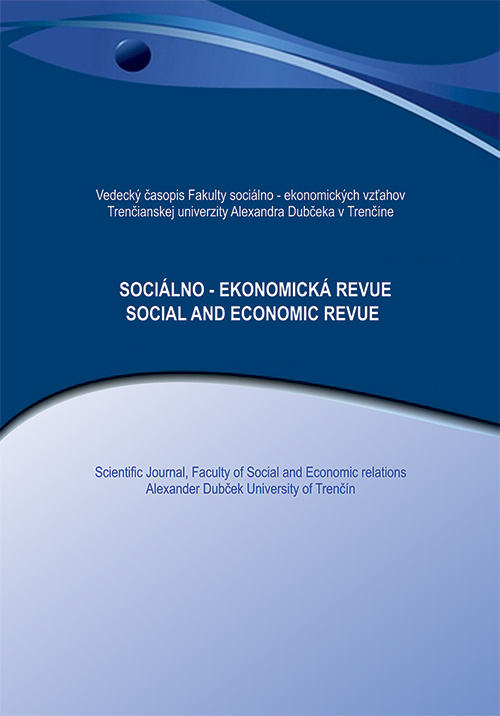POLARIZATION OF THE LABOUR MARKET BY IMPACT OF TECHNOLOGICAL DEVELOPMENT
The term polarization has been most used in the past to refer to income or property polarization, which, in various forms or intensities, has appeared throughout the history of the current population and has been a source of social tensions. There is now increasing interest in the polarization of the labour market due to technological development, which is gaining momentum in scientific research, and expresses the loss of medium-skilled jobs and an increase in both the highest and the lowest-skilled jobs. This represents a breakthrough in the typical thinking of the 20th century, when skills were perceived as dichotomous, so they could only be high or low. Also, more and more scientists are currently refuting previous views that technological progress will have the most serious impact on the lowest-skilled jobs. In this paper we examine the level of research of this scientific problem in the conditions of Slovakia, we supplement the findings with our own analyses and offer recommendations for further research in this field.
Vydanie: 2019/4 Strany: 25-32 Klasifikácia JEL: E24, J24, J31
DOI:
Kľúčové slová: labour market polarization, technological development, structural unemployment, wage level and structure
Sekcia:
Kontakty:
Ing. Natália Letková,
Department of Management and Development of Human
Resources
Faculty of Social and Economic Relations
Alexander Dubček University in Trenčín
Študentská 3, 911 50 Trenčín, Slovensko
e-mail: natalia.letkova@tnuni.sk
Literatúra:
Bachmann, R., Cim, M., Green, C. 2019. Long-Run Patterns of Labour Market Polarization: Evidence from German Micro Data In: British Journal of Industrial Relations, pp. 350–376. ISSN: 1467-8543
Florida R. and Mellander C. 2016. The geography of inequality: difference and determinants of wage and income inequality across US metros, In: Regional Studies, 50(1), pp. 79-92. ISSN: 1360-0591
Frič, M. 2018. Vplyv technologického pokroku na prehlbovanie ekonomickej nerovnosti. In: Budúcnosť Európy: Cesta k post-kapitalizmu? (Ed. Daubner, P.), pp. 28-47. ISBN 978–80–570–0356–4
Gagliardi, L. 2019. The impact of foreign technological innovation on domestic employment via the industry mix. In: Research Policy, 48 (2019), pp. 1523–1533. ISSN: 0048-7333
Høst, A. K., Winther, L. 2018. Job polarization in Danish cities in the new economy: location, size, and the role of the public sector. In: European Planning Studies, 27(9), pp. 1661-1686. ISSN: 1469-5944.
McIntosh, S. 2017. Labour market polarisation and the implications. In: Handbook of Contemporary Education Economics, 464 p. ISBN: 978 1 78536 906 3
Mokyr, J., Vickers, C., Ziebarth, N.L. 2015. The History of Technological Anxiety and the Future of Economic Growth: Is This Time Different? In: Journal of Economic Perspectives, Vol. 29/3 pp. 31–50. ISSN: 1944-7965.
Montresor, G. 2019. Job polarization and labour supply changes in the UK. In: Labour Economics, 58 (2019), pp. 187–203. ISSN: 0927-5371.
Oesch, D. Piccitto, G. 2019. The Polarization Myth: Occupational Upgrading in Germany, Spain, Sweden, and the UK, 1992–2015. In: Work and Occupations 0(0) 1–29, pp. 1- 30. ISSN: 1552-8464.
Palier, B. 2019. Work, social protection and middle class. In: Social security and the digital economy Vol. 72, Iss. 3, pp. 113-133. ISSN: 1468-246X.
Pauhofová, I. 2016. Aktuálne prístupy v skúmaní príjmovej polarizácie a nerovnosti na Slovensku. In: Ekonomický ústav SAV, working papers, p. 30. ISSN: 1337-5598.
Pauhofová, I. 2018. Determinanty a súvislosti polarizácie spoločnosti (Vybrané aspekty). In: Ekonomický ústav SAV, working papers, p. 33. ISSN 1337-5598.
Pauhofová, I., Stehlíková, B., Martinák, D., Páleník, M. 2016. Analýza príjmovej polarizácie v regiónoch Slovenska. In: Ekonomický ústav SAV, working papers, p. 77. ISSN: 1337-5598.
Plunkett, J., Pessoa, J.P. 2013. A Polarising Crisis? The changing shape of the UK and US labour markets from 2008 to 2012. In: Resolution Foundation, p. 24.
Seltzer, N. 2019. Beyond the Great Recession: Labor Market Polarization and Ongoing Fertility Decline in the United States. In: Demography (2019) 56, pp. 1463–1493. ISSN: 1533-7790.
Sojka, L., Svatková, S. 2015. Výzvy v riadení ľudských zdrojov v novom miléniu. In: Proceedings from international scientific correspondence conference EAEP, 2015, pp. 173 – 231. ISBN 978-80-555-1381-2.
Vojtovič, S. 2012. Koncepce personálního řízení a řízení lidských zdrojů. Grada Publishing. P. 192. ISBN:978-80-224-7394-89.


